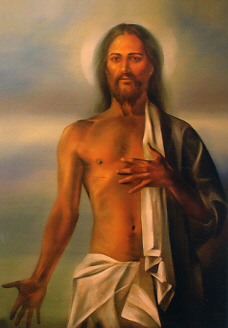|
†
Sacred Liturgy -
Easter Sunday |
|
EASTER SUNDAY
 "Christ
is Risen, Alleluia"
"Christ
is Risen, Alleluia"
"He is Risen Indeed, Alleluia, Alleluia"
With these joyous words Christians have greeted one another on
Easter Day for nearly two thousand years. And every Easter the
words proclaim anew the faith and hope of every Christian in the
Good News of God's profound love of mankind, a love that
conquers death. This Easter greeting is still used today. In the
Eastern Orthodox Churches this proclamation is made during the
Easter service as each person kisses the Gospel book.
Whenever Christians greet one another with these exultant
phrases, we affirm the unity of believers throughout all times
and ages until He comes again in glory. Every Christian family
can establish the custom of exchanging this historic greeting,
which is also a profession of faith, on Easter morning. It would
set an appropriate tone of rejoicing for the entire day (and a
reminder, also, for young children who may be so excited about
their Easter baskets that they tend to forget why we are
celebrating.)
Mass on Easter Day is the most splendid and exuberant
celebration of the Church. For this is the Sunday of Sundays,
the day of Resurrection of Christ, the center and foundation of
our faith. As Saint Paul said, "If Christ be not risen, your
faith is vain" [I Cor. 15:14, 17]. Thus Easter is the pinnacle
of all feasts of the Church year, which began with Advent, or
the expectation of the coming of the Messiah, sent by God to
provide the means for our Salvation. The culmination of the
entire liturgy is the Easter feast. Families who attend Mass on
Easter Day join millions of Christians all over the world --
past and present -- in joyous affirmation of our redemption
through the love of Christ, our hope of salvation, and our faith
in the resurrection from the dead and the life of the world to
come. Although the Easter Vigil and Mass fulfills the obligation
for Easter Mass, the Easter Day celebration is a highlight that
many will not want to miss, and it is permissible to attend
both.
Alleluia
Every element of the festive celebration of Mass on
Easter Day resounds with the great Alleluia the triumphant word
of praise for God of men and angels.
Alleluia (or hallelujah) is a Hebrew word adopted by the
Christian Church. (Another familiar Hebrew word is amen, "so be
it.") Hallel is the greatest expression of praise in Hebrew.
Combined with Jah, the shortened form of the name of God, JHVH
(meaning "I AM"), it becomes Hallelujah. Alleluia is a Latinized
spelling.
From the time of the apostles the proclaiming of the Alleluia
was a revered custom in ordinary life as well as in connection
with the liturgy of the Church. Farmers and tradesmen sang it as
they worked, and mothers taught their children to pronounce it
before any other word. According to Father Francis Weiser, "in
the Roman Empire the Alleluia became the favorite prayerful song
of oarsmen and navigators. The Roman poet-Bishop Sidonius
Apollinaris (480) described how the river banks and shores of
Gaul resounded with the Alleluia song of the rowing boatmen."
[Weiser, pp. 28-29] ("Alleluia" fits the familiar tune of the
Song of the Volga Boatman. Try it!)
In Christian homes on Easter morning children and parents might
greet each other with "Alleluia", then light a specially
decorated Easter candle. This word of praise on Easter morning
inspired Handel to write his famous Hallelujah Chorus. Playing a
recording of this magnificent Chorus from Messiah on Easter
morning is a memorable way of awaking the household to the joy
of the day and the promise of the coming Easter Mass and
celebration.
The Lord's Day
Every Sunday is a celebration of the Day of the Lord's
Resurrection. Every celebration of Mass commemorates all the
Easter Mysteries, the Lord's Supper at which Christ instituted
the Eucharist, the sacrifice of Christ on the Cross and His
Resurrection, the historic events on which Christianity is
based. And each Sunday celebrates the Descent of the Holy Spirit
on Pentecost (fifty days after Easter) which established the
Church.
Every Sunday, then, is a "little Easter." Every Sunday is
Christ's feast day. This is why the Sundays during Lent are
excluded from the forty days of penance; and why saints' feast
days are not ordinarily celebrated on Sunday. All Catholics are
seriously obliged to participate in the Church's celebration of
Mass on Sundays.
From the earliest days of the Church the celebration of the
Eucharist was made on the first day of the Jewish week . We know
this because specific reference is made to the Lord's day in
Acts 20:7: "And on the first day of the week, when we were
assembled together to break bread Paul discoursed with them";
and I Corinthians 16:2: "On the first of each week, let everyone
of you personally put aside something and save it up as he has
prospered"
The word Sunday, dies solis, or "day of the sun" is a
pre-Christian word retained by the Church (in English speaking
countries) because it emphasizes the belief that Christ is the
"Sun of Righteousness." Saint John, in Revelation 1:10, refers
to the dies dominica, "the Lord's day.
Taken from:
http://www.wf-f.org/EasterDay.html
Return to the main page for Holy Week»»
This page is the work of the Servants of the Pierced Hearts of Jesus and
Mary
Copyright © 2006-2010 SCTJM